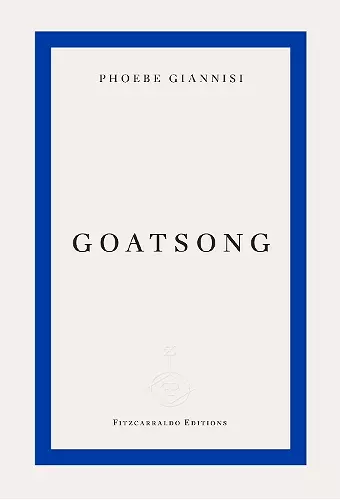Goatsong
Phoebe Giannisi author Brian Sneeden translator
Format:Paperback
Publisher:Fitzcarraldo Editions
Published:6th Nov '25
Should be back in stock very soon

The ancient Greek word for tragedy (τραγωδία) is a compound of goat (τράγος) and song (ᾠδή). In Phoebe Giannisi's Goatsong, the seam that connects human and animal, myths and history, is the body.
In Giannisi’s language, life obeys myth. A man places a screaming cicada in his mouth, reminding us of a scene from Plato’s Phaedrus, where Socrates claims cicadas to have been humans who became entranced by the invention of singing, and didn’t stop to eat or drink. When the goddess Thetis dips her newborn son, Achilles, into the River Styx to protect all but his famous heel where her hand grips, we’re told ‘the place of the mother’s grip / is the mark of death.’ Adjacent to the mythical setting is the material, where the rumination of goats, their digestive cycle – chewing, swallowing, then recalling food back into the mouth to be reconsidered – begins after weaning, and is lain alongside how we think: ‘from the moment of separation / from the mother / they ruminate.’ In these lyric enactments, all is transformative and transformed; territories of land, the body and history are blurred, and nothing is still.
From Homer to Donna Haraway, Derrida to state archives, klephtic ballads and rebetiko, to Parmenides and Giannisi’s dog, Ivan, the many human and animal voices of Goatsong form an incantatory lyricism and layered engagement unique in literature.
‘Goatsong intoxicates with its animality of language, gorgeous lyric and off-kilter metamorphoses, by turns wry, ecstatic and strange. Reading Phoebe Giannisi is like reading pre-Socratic philosophy on all fours, where flies buzz on and off the page and the polyphony of species and elements is both dazzling subject and all-encompassing medium.’
— Daisy Lafarge, author of Paul
‘I was immersed in Phoebe Giannisi’s Goatsong. I grieved with her as a mother, and rejoiced with her as a lover of all wild and wonderful places. Her work lives in me and inspires me to work harder to capture the truth – as the best poetry always does.’
— Sasha Dugdale, author of The Strongbox
‘In Goatsong, Brian Sneeden’s clever, musical translation introduces English readers to an important new poetic voice. The first two sections, Homerica and Cicada, are dreamy and elemental. Lines swill like waves, occasionally carrying something sharper onto the shore: a witticism, trash, teeth. Then comes Chimera, a remarkable polyphonic hymn to goats and the goatself, in which Phoebe Giannisi takes the pastoral and creates something wild, visceral and wholly new.’
— Clare Pollard, author of Delphi
‘A book that is also an ecosystem, full of impossible crossings and alive with unexpected communions.’
— Fani Avramopoulou, Antiphony (praise for Chimera)
‘Some of the best of her lyric writing… strange and captivating.’
— Publishers Weekly (praise for Chimera)
‘Giannisi is unquestionably herself within a vanguard of Greek poets for whom self-awareness and honesty have become second nature.’
— Shon Arieh-Lerer, World Literature Today (praise for Homerica)
‘An intimate and utterly feminine perspective on language and regeneration.’
— Jessica Gigot, The New York Times (praise for Cicada)
ISBN: 9781804271896
Dimensions: unknown
Weight: unknown
300 pages